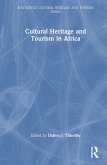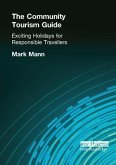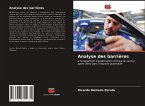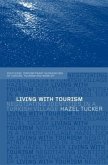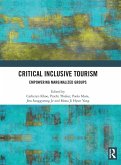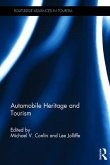Cultural Heritage, Community Engagement and Sustainable Tourism
Case Studies from Archaeological Sites in the Global South
Herausgeber: Rabbani, Maria; Mithen, Steven; Rabbani, Mubariz Ahmed
Cultural Heritage, Community Engagement and Sustainable Tourism
Case Studies from Archaeological Sites in the Global South
Herausgeber: Rabbani, Maria; Mithen, Steven; Rabbani, Mubariz Ahmed
- Gebundenes Buch
- Merkliste
- Auf die Merkliste
- Bewerten Bewerten
- Teilen
- Produkt teilen
- Produkterinnerung
- Produkterinnerung
This timely and innovative book critically explores how cultural heritage in the global south can be used to mobilise community engagement and promote sustainable tourism at archaeological sites.
Andere Kunden interessierten sich auch für
![Cultural Heritage and Tourism in Africa Cultural Heritage and Tourism in Africa]() Cultural Heritage and Tourism in Africa178,99 €
Cultural Heritage and Tourism in Africa178,99 €![The Community Tourism Guide The Community Tourism Guide]() Mark MannThe Community Tourism Guide130,99 €
Mark MannThe Community Tourism Guide130,99 €![Tourism at the Grassroots Tourism at the Grassroots]() John Connell / Barbara Rugendyke (eds.)Tourism at the Grassroots140,99 €
John Connell / Barbara Rugendyke (eds.)Tourism at the Grassroots140,99 €![Analyse des barrières Analyse des barrières]() Ricardo Romero-ZarateAnalyse des barrières26,99 €
Ricardo Romero-ZarateAnalyse des barrières26,99 €![Living with Tourism Living with Tourism]() Hazel TuckerLiving with Tourism202,99 €
Hazel TuckerLiving with Tourism202,99 €![Critical Inclusive Tourism Critical Inclusive Tourism]() Critical Inclusive Tourism191,99 €
Critical Inclusive Tourism191,99 €![Automobile Heritage and Tourism Automobile Heritage and Tourism]() Automobile Heritage and Tourism229,99 €
Automobile Heritage and Tourism229,99 €-
-
-
This timely and innovative book critically explores how cultural heritage in the global south can be used to mobilise community engagement and promote sustainable tourism at archaeological sites.
Hinweis: Dieser Artikel kann nur an eine deutsche Lieferadresse ausgeliefert werden.
Hinweis: Dieser Artikel kann nur an eine deutsche Lieferadresse ausgeliefert werden.
Produktdetails
- Produktdetails
- Verlag: Taylor & Francis Ltd
- Seitenzahl: 360
- Erscheinungstermin: 20. Juni 2025
- Englisch
- Abmessung: 234mm x 156mm
- ISBN-13: 9781032792255
- ISBN-10: 1032792256
- Artikelnr.: 72653917
- Herstellerkennzeichnung
- Libri GmbH
- Europaallee 1
- 36244 Bad Hersfeld
- 06621 890
- Verlag: Taylor & Francis Ltd
- Seitenzahl: 360
- Erscheinungstermin: 20. Juni 2025
- Englisch
- Abmessung: 234mm x 156mm
- ISBN-13: 9781032792255
- ISBN-10: 1032792256
- Artikelnr.: 72653917
- Herstellerkennzeichnung
- Libri GmbH
- Europaallee 1
- 36244 Bad Hersfeld
- 06621 890
Steven Mithen, FBA, is Professor of Early Prehistory at the University of Reading, UK. His research interests include the origins of language, music, and thought, hunter-gatherers and the emergence of farming. He has undertaken long-term field projects in southern Jordan and Western Scotland and is a founding member of a local charity in Scotland (Islay Heritage, SCO46938). His books include The Prehistory of the Mind (1996), After the Ice: A Global Human History 20,000-5000 BC (2003), The Singing Neanderthals (2005), Third: Water and Power in the Ancient World (2007) and The Language Puzzle (2024). Mubariz Ahmed Rabbani conducts research on the archaeology of South Asia, with an interest in ancient technologies, socio-economic and political organisation, trade, religion, and human-environmental relationships. He completed his PhD in archaeology at the University of Reading and worked on excavations in Pakistan, Iraq, and the UK. He is a member of the ISMEO Italian Archaeological Mission in Pakistan. Maria Rabbani is a Palynologist for Oxford Archaeology. She completed her PhD at the University of Reading, which focussed on human-environmental interactions in the Zagros region during the Late Pleniglacial, Lateglacial and Holocene, using pollen, non-pollen palynomorph, micro-and macro-charcoal and geochemical analyses. Maria has experience in working on lake and wetland sediment and pollen from the UK, Italy, Iran and Iraq.
'1. Introduction. Section 1. Asia. 2. The Faynan Heritage Project:
Developing a Local Museum Within a Rural Bedouin Community of Southern
Jordan. 3. Developing a Heritage-themed Bedouin Handicraft Business in
Faynan, Jordan: Success, Failure and Reflections. 4. Community-based
Conservation and Promotion of the Neolithic Site of Beidha, Jordan. 5.
SELA: Community and Heritage in Jordan. 6. The Land of Nineveh
Archaeological Project: Cultural Heritage Protection and Enhancement,
Community Engagement, and Sustainable Tourism in the Kurdistan Region of
Iraq. 7. Building Community Archaeology Practice and Heritage Tourism for
Sustainable Development in a Post-Conflict Zone: The ACT and ALIPH Projects
in the Swat Valley (Pakistan). 8. Initiating the Transformation of Spanish
Colonial Era Archaeology of Cagayan Province, Philippines, into Cultural
Heritage. Section 2. Africa. 9. Community and Archaeology at Armana:
Exploring Sustainable Heritage Strategies for Rural Egypt. 10.
Community-Engaged Archaeology at the UNESCO World Heritage Site of Jebel
Barkal, Sudan. 11. Co-Production Networks for Community Heritage in
Tanzania (CONCH). Section 3. Central and South America. 12. Santa Cruz
Mixtepec: Community Engagement and Religious Heritage in Mexico. 13.
Biocultural Heritage and Archaeology as Sources of Knowledge, Cultural
Identity, Sustainable Tourism and Economic Resilience in Ligüiqui, Manabí,
Ecuador. 14. The PIARA Peru Project at Hualcayán: An Archaeology and
Partnership of Care. 15. Utilising Cultural Heritage to Improve Water
Security and Agro-Pastoral Farming in the Peruvian Andes. Section 4.
Overview. 16. Experiences, Lessons, Celebration.
Developing a Local Museum Within a Rural Bedouin Community of Southern
Jordan. 3. Developing a Heritage-themed Bedouin Handicraft Business in
Faynan, Jordan: Success, Failure and Reflections. 4. Community-based
Conservation and Promotion of the Neolithic Site of Beidha, Jordan. 5.
SELA: Community and Heritage in Jordan. 6. The Land of Nineveh
Archaeological Project: Cultural Heritage Protection and Enhancement,
Community Engagement, and Sustainable Tourism in the Kurdistan Region of
Iraq. 7. Building Community Archaeology Practice and Heritage Tourism for
Sustainable Development in a Post-Conflict Zone: The ACT and ALIPH Projects
in the Swat Valley (Pakistan). 8. Initiating the Transformation of Spanish
Colonial Era Archaeology of Cagayan Province, Philippines, into Cultural
Heritage. Section 2. Africa. 9. Community and Archaeology at Armana:
Exploring Sustainable Heritage Strategies for Rural Egypt. 10.
Community-Engaged Archaeology at the UNESCO World Heritage Site of Jebel
Barkal, Sudan. 11. Co-Production Networks for Community Heritage in
Tanzania (CONCH). Section 3. Central and South America. 12. Santa Cruz
Mixtepec: Community Engagement and Religious Heritage in Mexico. 13.
Biocultural Heritage and Archaeology as Sources of Knowledge, Cultural
Identity, Sustainable Tourism and Economic Resilience in Ligüiqui, Manabí,
Ecuador. 14. The PIARA Peru Project at Hualcayán: An Archaeology and
Partnership of Care. 15. Utilising Cultural Heritage to Improve Water
Security and Agro-Pastoral Farming in the Peruvian Andes. Section 4.
Overview. 16. Experiences, Lessons, Celebration.
'1. Introduction. Section 1. Asia. 2. The Faynan Heritage Project:
Developing a Local Museum Within a Rural Bedouin Community of Southern
Jordan. 3. Developing a Heritage-themed Bedouin Handicraft Business in
Faynan, Jordan: Success, Failure and Reflections. 4. Community-based
Conservation and Promotion of the Neolithic Site of Beidha, Jordan. 5.
SELA: Community and Heritage in Jordan. 6. The Land of Nineveh
Archaeological Project: Cultural Heritage Protection and Enhancement,
Community Engagement, and Sustainable Tourism in the Kurdistan Region of
Iraq. 7. Building Community Archaeology Practice and Heritage Tourism for
Sustainable Development in a Post-Conflict Zone: The ACT and ALIPH Projects
in the Swat Valley (Pakistan). 8. Initiating the Transformation of Spanish
Colonial Era Archaeology of Cagayan Province, Philippines, into Cultural
Heritage. Section 2. Africa. 9. Community and Archaeology at Armana:
Exploring Sustainable Heritage Strategies for Rural Egypt. 10.
Community-Engaged Archaeology at the UNESCO World Heritage Site of Jebel
Barkal, Sudan. 11. Co-Production Networks for Community Heritage in
Tanzania (CONCH). Section 3. Central and South America. 12. Santa Cruz
Mixtepec: Community Engagement and Religious Heritage in Mexico. 13.
Biocultural Heritage and Archaeology as Sources of Knowledge, Cultural
Identity, Sustainable Tourism and Economic Resilience in Ligüiqui, Manabí,
Ecuador. 14. The PIARA Peru Project at Hualcayán: An Archaeology and
Partnership of Care. 15. Utilising Cultural Heritage to Improve Water
Security and Agro-Pastoral Farming in the Peruvian Andes. Section 4.
Overview. 16. Experiences, Lessons, Celebration.
Developing a Local Museum Within a Rural Bedouin Community of Southern
Jordan. 3. Developing a Heritage-themed Bedouin Handicraft Business in
Faynan, Jordan: Success, Failure and Reflections. 4. Community-based
Conservation and Promotion of the Neolithic Site of Beidha, Jordan. 5.
SELA: Community and Heritage in Jordan. 6. The Land of Nineveh
Archaeological Project: Cultural Heritage Protection and Enhancement,
Community Engagement, and Sustainable Tourism in the Kurdistan Region of
Iraq. 7. Building Community Archaeology Practice and Heritage Tourism for
Sustainable Development in a Post-Conflict Zone: The ACT and ALIPH Projects
in the Swat Valley (Pakistan). 8. Initiating the Transformation of Spanish
Colonial Era Archaeology of Cagayan Province, Philippines, into Cultural
Heritage. Section 2. Africa. 9. Community and Archaeology at Armana:
Exploring Sustainable Heritage Strategies for Rural Egypt. 10.
Community-Engaged Archaeology at the UNESCO World Heritage Site of Jebel
Barkal, Sudan. 11. Co-Production Networks for Community Heritage in
Tanzania (CONCH). Section 3. Central and South America. 12. Santa Cruz
Mixtepec: Community Engagement and Religious Heritage in Mexico. 13.
Biocultural Heritage and Archaeology as Sources of Knowledge, Cultural
Identity, Sustainable Tourism and Economic Resilience in Ligüiqui, Manabí,
Ecuador. 14. The PIARA Peru Project at Hualcayán: An Archaeology and
Partnership of Care. 15. Utilising Cultural Heritage to Improve Water
Security and Agro-Pastoral Farming in the Peruvian Andes. Section 4.
Overview. 16. Experiences, Lessons, Celebration.


